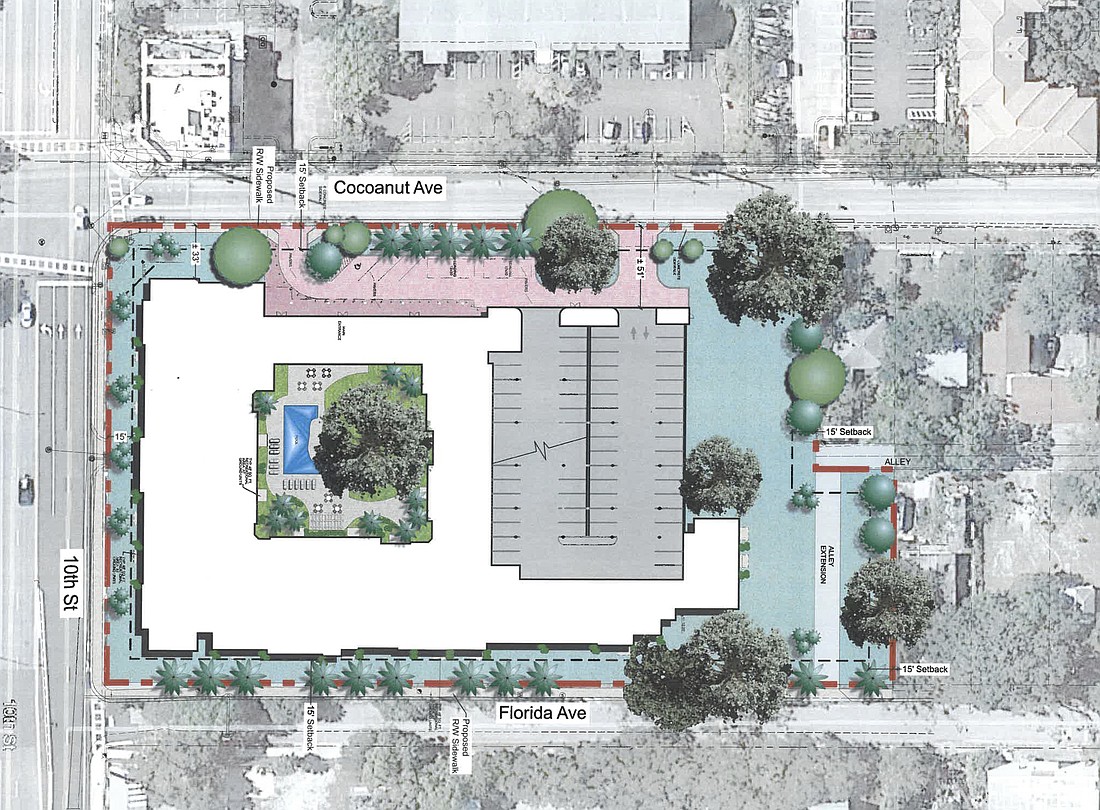- November 24, 2024
-
-
Loading

Loading

When Terrill Salem looked at plans for an apartment complex on 10th Street — and accompanying applications to change the underlying property’s zoning and vacate the city’s control of an alleyway — he saw an opportunity to take on a major issue facing the region.
Salem is a member of the city’s Planning Board, which on July 14 reviewed a proposal for a 157-unit residential complex called Luxe on Tenth. Cincinnati-based developer Commercial Investment Group is seeking a comprehensive plan change and a reclassification of the site to the high-density Residential Multiple Family-7 zoning designation, which allows up to 50 units per acre if a development includes some affordable housing.
Under the proposed site plan, Luxe on Tenth would include 47 affordable apartments on 3.5 acres of land on 10th Street between Cocoanut Avenue and Florida Avenue. That’s more than the 20 units the city’s zoning code requires the developer to include, but Salem did not think the application went far enough. On balance, he argued, the proposal was not in the public’s best interest. The affordable units would be one bedroom and rented to individuals making up to 120% of the median income in the region. The latter provision is in line with city regulations, but Salem said Sarasota needs more units that lower-income families can live in.
At the July 14 meeting, Salem encouraged his colleagues to ask more of the developer. He said the applicant was asking for a street vacation the city was under no obligation to grant. He acknowledged the property owner could build on the site under the existing zoning and not provide any affordable housing, but he believed his desired changes would not have a detrimental effect on the overall project.
“It’d be in the best interest of the public if we get something in return,” Salem said. “We have a housing crisis in Sarasota. We have working people that cannot live in the city that they work in.”
Salem’s push for additional affordable housing drew a reprimand from multiple city commissioners at a July 20 meeting. Commissioner Erik Arroyo noted the site plan application included more than twice as many affordable units as the minimum required in the zoning code, and he questioned whether there were any limits on the city’s ability to ask more of a developer than regulations demand.
“At what point do we stop and say, ‘Well, that’s sort of extortion in a way’?” Arroyo said. “Why don’t we have a set procedure in place to make sure we are abiding by these standards and we’re not just making up our own requirements before we approve projects?”
Arroyo said he believed the city needed to address the matter internally. In an interview following the meeting, Planning Director Steve Cover said staff had a clear stance on the matter: Leaning on developers to secure concessions not required in the code is off-limits.
Cover said planning staff can have a dialogue with a developer before plans are finalized, but they’re not allowed to mandate such changes as a lower affordability cap. Cover said staff is generally receptive to any plans that include affordable units.
“We’re obviously going to support it because we support affordable housing in the city,” he said.
During the July 14 meeting, Deputy City Attorney Mike Connelly told the Planning Board that the review of the Luxe on Tenth applications was a quasi-judicial matter, and that board members needed to determine whether the proposal complied with specific standards for review. In explaining his vote against the street vacation, Salem cited the final standard for review: “whether the proposed vacation is in the public interest.”
The Planning Board voted 3-2 to recommend denial of the site plan, rezoning and street vacation applications for Luxe on Tenth. Other board members who recommended denial did not share Salem’s focus on affordable housing and instead offered critiques about the site layout and the potential loss of the alley. In response to a question from city officials at the July 14 meeting, representatives for the developer said they were not interested in revising the proposal to incorporate input from the Planning Board.
The development applications are scheduled to go to the City Commission for review beginning in August.